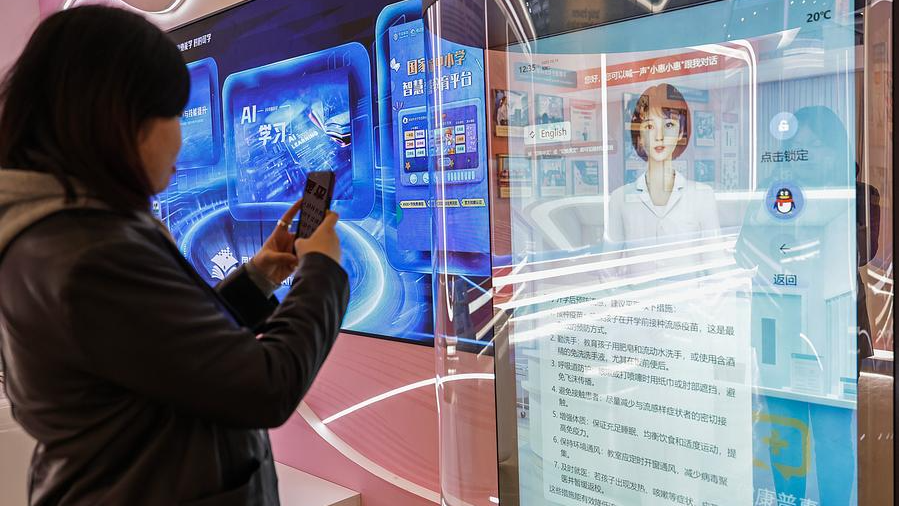A visitor takes photos of an AI interactive screen during an exhibition showcasing China's progress in digital and intelligent empowerment for women and girls, in Beijing, capital of China, Oct. 14, 2025. (Xinhua/Zhang Yuwei)
Despite recent trade frictions, he called on the EU and China to keep treating each other as development partners and to deepen cooperation built on mutual respect and common prosperity.
BRUSSELS, Oct. 29 (Xinhua) -- The European Union (EU) and China have significant potential to cooperate in translating research into industrial products and achieving economies of scale, a member of the European Parliament said in an interview with Xinhua.
Ondrej Dostal, a Czech member of the European Parliament, told Xinhua that while Europe has a solid research base, it often struggles to convert innovations from the lab to mass production, where China's vast market and complete industrial chains could make a difference.
"For some scientific advances to happen, it needs the big consumer market of China to be economically feasible," he said.
According to Dostal, biopharmaceuticals could be a vital field of deeper cooperation, while European states have academic strengths but a limited market scale.
"China's big market can help us, because some innovations can only go from the scientific level to the industrial level, given the sufficient scale of the market," he said.
A girl touches an electric robot at the e-SALON in Prague, the Czech Republic, on Nov. 8, 2024. (Photo by Dana Kesnerova/Xinhua)
Dostal also stressed that China remains essential to Europe's pharmaceutical supply chain.
"Even if we started today to rebuild our pharmaceutical industry, we would not be able to supply our citizens in one to three years," he said. "The continued trade with China is a necessity."
He rejected the notion of viewing China as a "systemic rival," arguing that cooperation based on a "development partnership" would better serve both sides.
Dostal took artificial intelligence (AI) as an example, saying that it represents a promising area for China and the EU to deepen cooperation while promoting innovation, and support growth in sectors including finance, manufacturing, and healthcare. He added that some Chinese AI solutions are "affordable and efficient."
In the machinery sector, according to Dostal, Europe could be a good supplier to China, or participate in mutual development projects in states of the "Global South." The Czech Republic, for example, has expertise in components and engineering for power plants, while China can remain a major export market for European car brands.
To sustain such cooperation, Dostal said keeping diplomatic communication open is crucial. The recent resumption of inter-parliamentary exchanges between China and the EU was "a positive signal."
"The meeting itself is a success, and it is a hope for a continuous dialogue," he said.
He expressed hope that such parliamentary-level communication could be further extended to the governmental and industrial levels, where more mutual visits and face-to-face exchanges would help advance pragmatic cooperation and deliver greater progress.
Despite recent trade frictions, he called on the EU and China to keep treating each other as development partners and to deepen cooperation built on mutual respect and common prosperity.
Customs staff check a China-Europe freight train parking at the Horgos railway port in Horgos, northwest China's Xinjiang Uygur Autonomous Region, Sept. 10, 2025. (Xinhua/Li He)
"For Europe, China has been and will always be a great market," he said.




 A single purchase
A single purchase









